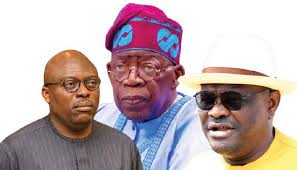
Rivers State has been engulfed in a political crisis since October 2023, stemming from a power struggle between Governor Siminalayi Fubara and his predecessor, FCT Minister Nyesom Wike. This conflict has escalated through impeachment attempts, defections, budget disputes, violent protests, and contradictory court rulings. In March 2025, after Supreme Court intervention failed to resolve the crisis, the President declared a state of emergency, suspending the governor, deputy governor, and legislature, and appointing a military administrator. A controversial move that many argue exceeds constitutional authority. But how did we get here? This article breaks down the events leading up to the current crisis.
BACKGROUND TO THE CRISIS
The crisis began in May 2023, when Governor Siminlayi Fubara took over the helm of affairs of Rivers State from, now-former governor and current minister of the FCT, Nyesom Wike who picked him to be his successor.
However, the relationship between them wasn’t to last, as six months later relations between them soured as the two became political enemies and Rivers state became a political battleground where chaos and destruction were fast becoming the norm over the vested interest of the two individuals in this case, the Governor and his estranged godfather. The People’s Democratic Party (PDP), which both men belong to, became fractured in the state as lawmakers aligned themselves with either Governor Fubara or Wike, setting the stage for the constitutional crisis that would follow.
This timeline of events was heralded by an attack on the state legislative complex in what was widely considered to be a calculated attempt to stop the assembly from commencing impeachment proceedings against the governor. However, on 30th October 2023, pro-Wike Lawmakers went ahead to initiate impeachment proceedings against Governor Fubara over what they described as “misconduct unbecoming of a Governor.” This led to the intervention of the President, and a mediation between the parties took place which sought to establish peace between the parties. But the resulting peace was short-lived as both parties were soon at loggerheads again.
On the 11th of December 2023, 27 pro-Wike lawmakers announced their defection from the PDP to the APC, referencing divisions and lack of leadership in the party as the reason for their move. This kickstarted another political battle between Governor Fubara and the House of Assembly. Four members loyal to the Governor, after declaring the seat of the 27 lawmakers vacant, continued with legislative business in the government house after the earlier demolition of the state house of assembly in October 2023. In an uncommon move, the Governor presented the state’s 2024 ₦800 billion budget to the four-member assembly led by Edison Ehie. This budget was signed into law on 14 December 2023; 24 hours after the governor presented it before a four-member assembly.
Again, on 18 December 2023, the President met with the two parties where Wike and Governor Fubara signed a peace deal at the Presidential Villa, Abuja. After the signing of this deal, the Wike-aligned lawmakers withdrew the impeachment notice they had earlier served Governor Fubara. The speaker of the three-man assembly faction loyal to Governor Fubara, Mr Ehie resigned and also withdrew the contempt suit filed against the pro-Wike Lawmakers. The Governor also went ahead to reappoint the nine pro-Wike commissioners who had resigned earlier at the peak of the power tussle between Wike and Governor Fubara, and they were reconfirmed by the House of Assembly.
However, this peace was not to last. By January 26, 2024, the first signs of the agreement’s collapse emerged when the Rivers Assembly stripped Governor Fubara of his power to appoint caretaker committees for local government councils. The Assembly overrode the Governor’s veto of this legislation, further signalling the deteriorating relationship. Months later tensions escalated again when Governor Fubara reshuffled his cabinet, reassigning three commissioners known to be Wike supporters. These commissioners rejected their reassignments and promptly resigned, demonstrating that the factional lines remained firmly drawn despite the peace agreement.
THE COLLAPSE OF THE PEACE DEAL
On May 6th 2024, Governor Fubara declared that Rivers State had no House of Assembly and that the members did not exist referring to the pro-Wike lawmakers. Two days later, Victor Oko Jumbo emerged as speaker of a three-member Rivers House of Assembly. This further deepened the ongoing political crisis in the state. Later on, the Governor relocated the legislative business of the Assembly to the government house. In the same vein, a State High Court sitting in Portharcourt barred Mr Wike’s allies from parading themselves as lawmakers. The Governor also vowed to probe the administration of his predecessor, Mr Wike.
During this time, five more commissioners resigned from Governor Fubara’s cabinet citing various reasons. On 7th June the state government approved 19.6 billion for the reconstruction of the Rivers House of Assembly after it was demolished six months before. On 18th June 2024, the governor directed outgoing local government officials to vacate office following the expiration of their tenure. The political crisis escalated into street violence and led to the death of two persons, which included a police operative. When this happened the Police took over the 23 local government secretariats in the state.
By July 2024, the Appeal Court in Abuja reinstated the pro-Wike lawmakers. The court also stated that the lower court lacked the jurisdiction to grant the ex parte order it issued. After their reinstatement, the Pro Wike lawmakers gave the governor a seven-day ultimatum to re-present the 2024 budget for their consideration, which the governor refused to do. pro-Wike lawmakers approached a federal high court in Abuja, praying the court to stop Fubara from spending state funds but this prayer was declined.
Amidst violence, protests, court cases and conflicting court orders, the state conducted the local government elections on the 5th of October 2024. The APP, the political party affiliated with the governor won 22 local council seats with Action Alliance winning one. Governor Fubara inaugurated the chairpersons at the Government House the next day.
In October 2024, the police unsealed local government secretariats in the State after four months. Hoodlums who were dissatisfied with the outcome of the elections set ablaze local government council secretariats in Ikwerre, Emohua, and Eleme. The President once again intervened asking political actors to uphold the rule of law and discourage supporters from engaging in destructive actions. The next day, the Governor set up a seven-man judicial panel to investigate the cause of the post-election violence and make recommendations for a resolution.
Meanwhile, the Court of Appeal in Abuja affirmed pro-Wike lawmakers as the legitimate legislative authority in the state and also nullified the 2024 budget. The Governor filed an appeal at the Supreme Court insisting that the seat of the defected lawmakers remain vacant.
By February 2025, the Supreme Court reinstated the Pro Wike lawmakers and restored Martins Amaewhule as the speaker of the Rivers State House of Assembly. The court also nullified the local election organised by Fubara’s administration. Subsequently, the lawmakers gave the Governor 48 hours to re-present the 2025 budget which he had presented to a 3 man led House of Assembly last year and was assented to by him on January 2nd 2025.
His effort to re-present the budget was frustrated by the lawmakers who denied him access to the House of Assembly quarters. The battle once again took a new twist when the Assembly served both the governor and his deputy an impeachment notice on Monday for alleged misconduct. With this notice, it was clear that the House had resumed the plot to impeach the Governor.
CURRENT SITUATION AND CONSTITUTIONAL QUESTIONS
The events took a surprising turn when on Tuesday, the President in a broadcast declared a state of emergency in Rivers State which also included the suspension of the Governor, his deputy and the legislative arm of government. The President earlier in the broadcast mentioned that the Governor had failed to facilitate the implementation of the orders the Supreme Court made to restore the state to immediate democracy after months of breakdown of law and order and that all of his earlier efforts to broker peace between the warring parties had been ignored by both parties. Even more, according to the President, “Some militants had threatened fire and brimstone against their perceived enemies of the governor who has up till now NOT disowned them.”
He went on to say that after close reflection on the political situation in Rivers State and the Governor and his deputy’s failure to request him as President to issue a proclamation as required by section 305(5) of the Constitution of the Federal Republic of Nigeria, 1999 as amended, it has become inevitably compelling for him to invoke the provision of section 305 of the Constitution as amended to declare a state of emergency in Rivers State. He also nominated Vice Admiral Ibok-Ette Ekwe Ibas (Rtd) as Administrator to take charge of the affairs of the state and restore law and order.
The President’s declaration of a state of emergency marks an unprecedented development in this political crisis. While invoking Section 305 of the Constitution allows for emergency declarations in situations of breakdown of public order and safety, many have questioned whether the Constitution grants the President the power to suspend elected officials. The appointment of Vice Admiral Ibok-Ette Ekwe Ibas (Rtd) as Administrator signifies federal intervention at its most extensive level, for now, it remains unclear if this action will be challenged in the courts and what the outcome will be.
